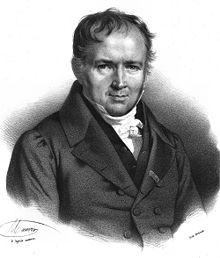Poisson-ligning

Poisson-ligning eller Poissons ligning er en elliptisk partiel differentialligning med bred anvendelse inden for teoretisk fysik. Eksempelvis bliver den brugt til at finde det potentielle felt skabt af en given elektrisk ladning eller massedensitetsfordelingen; når det potentielle felt er kendt er det muligt at beregne det elektrostatiske felt eller tyngdefelt. Ligningen er givet ved
hvor er Laplace-operatoren, er en kendt funktion, og er den ukendte funktion.
Det er en generalisering af Laplace' ligning, der også bliver anvendt flere steder inden for fysik. Ligningen har navn efter matematikeren og fysikeren Siméon Denis Poisson.[1][2]
Referencer
- ^ Jackson, Julia A.; Mehl, James P.; Neuendorf, Klaus K. E., red. (2005), Glossary of Geology, American Geological Institute, Springer, s. 503, ISBN 9780922152766
- ^ Poisson (1823). "Mémoire sur la théorie du magnétisme en mouvement" [Memoir on the theory of magnetism in motion]. Mémoires de l'Académie Royale des Sciences de l'Institut de France (fransk). 6: 441-570.From p. 463: "Donc, d'après ce qui précède, nous aurons enfin:
selon que le point M sera situé en dehors, à la surface ou en dedans du volume que l'on considère." (Thus, according to what preceded, we will finally have:
depending on whether the point M is located outside, on the surface of, or inside the volume that one is considering.) V is defined (p. 462) as:
where, in the case of electrostatics, the integral is performed over the volume of the charged body, the coordinates of points that are inside or on the volume of the charged body are denoted by , is a given function of and in electrostatics, would be a measure of charge density, and is defined as the length of a radius extending from the point M to a point that lies inside or on the charged body. The coordinates of the point M are denoted by and denotes the value of (the charge density) at M.












